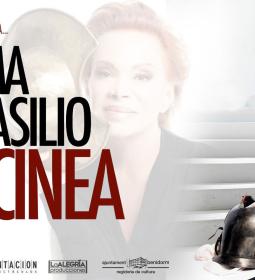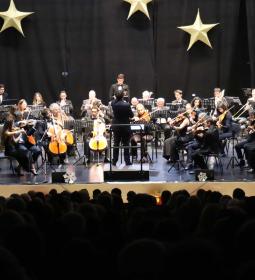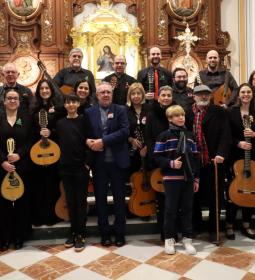Antonio Bravo, the author, highlights his great work of patronage and historical research focused on Benidorm and the Real Senyera
“Memory of Benidorm and the Kingdom of Valencia”; presented the biography of Pere Mª Orts and Bosch

As the "biography of a unique and multifaceted character written by an Asturian in love with Benidorm" defined by Professor Francisco Amillo, introducer of the presentation of the book 'Pere María Orts i Bosch 1921-2021 Memory of Benidorm and the Kingdom of Valencia, the work by Antonio Bravo, a professor who was from the University of Oviedo and has lived in Benidorm for 18 years, who, with the sponsorship of the Department of Culture of the Benidorm City Council, was presented last night in the municipal Assembly Hall and integrated into the celebration of the Year Pere María Orts, on the occasion of his centenary.
With the assistance of the Councilor for Culture Jaime Jesús Pérez and other members of the Corporation and before an expectant audience for the new documentary content, Bravo announced that a second edition is already underway.
He stressed that Orts "is important for his work and not for his life" emphasizing his patronage, "in all the arts, especially in puncture", to the point of considering him one of the most important in Spain: more than 200 paintings, of renowned painters, sumptuary and art objects, 11,000 books and more because, he said, there are still 65 boxes left in the Nicolau Primitiu Gómez Library with materials and documentation not yet catalogued.
Bravo highlighted his obsession with the historical memory of Valencians, art and the purity of the language that led him to the Valencian Academy of Language, of a man "who did not expect to live so long" but who made the most of it by investigating about Benidorm, the language and the flag from the perspective of "a conservative of progressive cultural ideas" who confronted the History of the Senyera to the Valencian Country or its references to the Historical Memory of the Valencians.
Regarding Benidorm, Bravo pointed to the compendium of articles on local history, full of details, and especially for his works and publications on the image of the patron saint, the Verge del Sofratge, and the Carta de Poblament, highlighting an extensive review of the collection of tapestries that are exhibited in the Plenary Hall of the Benidorm City Council, "compendium of 500 years of history of the Kingdom of Valencia", between the 13th and 18th centuries, of unparalleled historicist richness that was commissioned and paid for by Pere María Orts and made by the Royal Tapestry Factory of Madrid; “a unique and incomparable collection”.
Bravo concluded by recalling his work as a historical researcher and on the toponymy of the Valencian lands, his encyclopedic collaborations, prologues and novels, emphasizing his deep religiosity, his life trajectory, in which his sister Josefina could not be omitted, and his stories.







